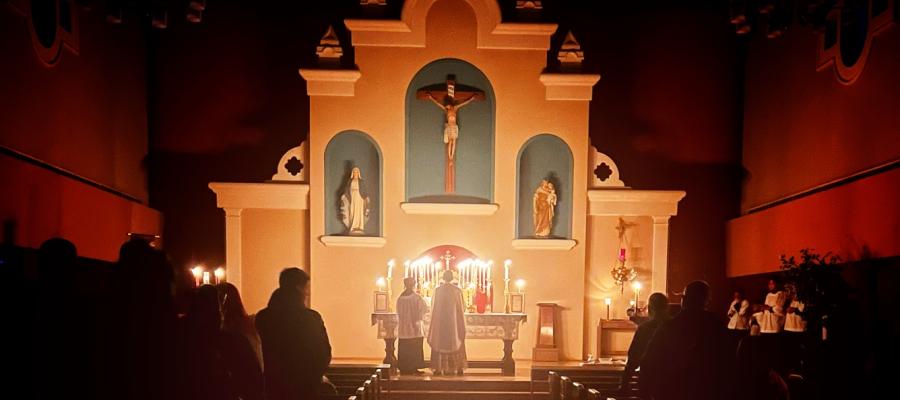
God Breaks into Human History
by Father Brian J. Soliven on Tuesday December 24, 2024
If you’re searching for peace of mind, consider stepping away from the constant barrage of news. It seems that every time we open an article, watch a broadcast, or glance at a headline, we are faced with a new crisis to fear. Whether it’s the turmoil of politics, the uncertainty of the economy, or the pain of global conflicts like Ukraine and Gaza, the weight can feel unbearable. And on top of all that, we each carry our own personal struggles—sickness, strained relationships, the everyday challenges of life. Our emotional bandwidth is limited, and it can often feel like we're drowning in a sea of despair.
In the midst of all this, many of us are left grappling with the deepest questions of life. What is the point of it all? What is the meaning behind the suffering we endure?
When Pope Benedict XVI was elected to the papacy in 2005, he embarked on a profound journey that had been simmering in his heart for decades. He longed to write a book that would return the world to the central, life-changing truth of Christianity: the person of Jesus Christ. As a brilliant theologian, he saw how modern biblical scholarship had often lost touch with the core message of the Gospel. Pope Benedict sought to recenter our faith on the life of Jesus—a life that speaks not just to history, but to our heavy hearts.
In the opening of his book, he posed a thought-provoking question: “What did Jesus truly bring, if he didn’t bring peace to the world, well-being for all, and a better world?”
It's a question that many of us, in our deepest moments of doubt and pain, ask ourselves. Look at the chaos around us. Witness the suffering in our own lives. How can an all-powerful, all-loving God allow wars to rage on, allow our loved ones to suffer from illness, or allow the pain that seems so pervasive in this world? Pope Benedict cuts to the heart of this struggle with his honest question: “What did Jesus truly bring…?”
Our own experiences remind us that, even with faith, pain doesn't disappear. We still feel the ache of loss, the weight of sorrow. So, the logical question arises: What, then, is the point of being Christian? What difference does it make if we still face suffering?
Pope Benedict, in his calm, profound wisdom, answers with striking clarity: “The answer is very simple: God. He brought God.”
The scandal, the mystery, and the beauty of Christianity is this: God Himself entered into our brokenness. In the person of Jesus, He united His divinity with our frailty, our suffering, our pain. We call this the Incarnation—the moment when the Creator of the universe chose to dwell among us in all of our mess and confusion. He didn’t stay distant or aloof. He stepped into our world and became one with us.
Now, I know that answer doesn’t always soothe our aching hearts. It doesn’t erase the pain we feel in the face of personal tragedy or global despair. But it offers us something far greater: hope. It calls us to trust in a divine plan that we might not fully understand. It invites us to surrender to the mystery that, though we may not see it now, God has a purpose for our lives, even in the midst of suffering.
This is not an easy truth. But it is a profound one. It challenges us to place our faith not in the absence of pain, but in the presence of God within it. It calls us to trust that He knows what is best, even when we cannot see the path ahead.
In the end, the peace we seek isn't found in the absence of hardship, but in the presence of God—Emmanuel, God with us. That is why as we heard in this Sunday’s Gospel, the baby in Elizabeth’s womb could not help but “leap” when he heard Mary’s greeting.







